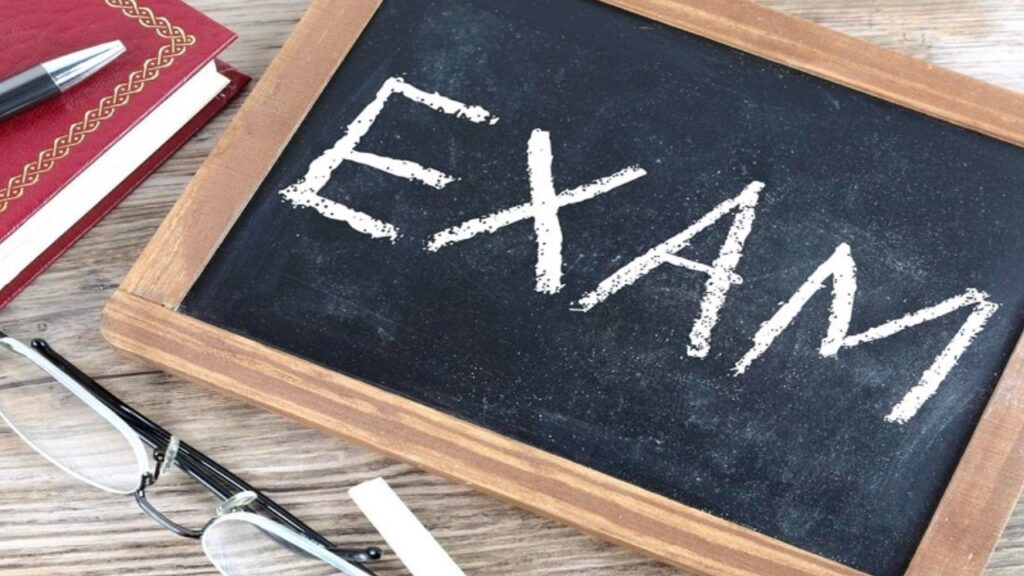Getting a good mark in exams is something all students worry about. “How to get good marks in exams” is a question every student asks. There are a few tips a student can use to score well.
Starting your preparation early is essential if you want to get good marks in exams. It’s essential to use a strategic writing strategy to increase your chances of doing well on an exam. Knowing your strengths and weaknesses will help you with your worries about how to get good marks in exams in less time.
Because of how the educational system is set up, having good grades is necessary to get into a reputable institution or be admitted to a college; everyone wants to do well in their examinations. Still, it’s vital to remember that it takes a lot of work and dedication on your part.
Vital Practices To Get Top Scores in Exams-
Here’s a guide any student can follow to get good marks in exams-

1. Organize The Study Materials
Gather all the required textbooks, notes, and resources for each subject as you organize your study materials. To properly organize your time, make a study timetable and set down precise times for each subject. You’ll be able to maintain attention and make sure you cover all the necessary stuff if you do this.
Identify the main ideas or subjects that will probably be covered in the exam. Prioritize learning these topics first to make sure you are well-versed in the fundamentals. Following this will help you to answer your worry about how to get good marks in exams.
To maintain order in your study materials, use folders or binders. To prevent materials from being mixed up, give each subject or module its folder. Each folder should be properly marked with the topic or subject name.

2. Review Your Class Notes
Ensure that your notes are accessible and well organized. To organize the information, use headings, subheadings, bullet points, and numbers.
Reading through your notes from beginning to end should be your first step. You will get a rough idea of the subjects discussed in class from this. Look for links between various subjects or ideas. Consider their connections and how they fit into a larger picture. You will gain a greater understanding of the subject matter as a result.
Read over your notes and make a list of the important topics. The secret to how to get good marks in exams in less time is to study the important topics. Put things in your own words to make sure you understand them completely. Your knowledge will be more solidified as a result, and you will be able to concentrate on the key details.
Highlight crucial information in your notes by using a highlighter or underlining formulas, definitions, or other crucial information. This will make it simpler to find them later and review them and give a clear understanding of how to get good marks in exams.

3. Understand The Exam Format
Start by reading through the syllabus that was given to you by your teacher or educational facility. You will receive an overview of the subjects examined and their relative importance.
Identify the many types of exam questions that could be asked. Multiple-choice, true/false, short answer, essay, problem-solving, and case study questions are typical. You can adjust your preparation by being aware of the various questions kinds. Understanding the format of the question is very helpful in understanding how to get good marks in board exams.
Any special instructions or directions offered for the exam should be noted. Recognize the guidelines for any further restrictions, such as word limits, marking criteria, and time constraints. Learn the appropriate format or presentation for answers. Following these guidelines can help you to learn more about how to get good marks in exams.
Obtain clarification from your instructor, teaching assistants, or fellow students if any elements of the exam format are unclear. To focus your study efficiently, it’s important to have an in-depth knowledge of the exam structure. These are the methods you should use to answer the query of how to write an exam paper to get good marks.

4. Practice Past Papers
Gather enough practice exams for the test you’re preparing for. Typically, you can locate them on the website of your educational institution, in online databases, or by asking your instructors.
Include dedicated study time in your overall study schedule for practicing past exams. Establish deadlines for each of the past papers you plan to complete.
When reviewing previous exams, make an effort to as closely replicate the exam environment as you can. Find a quiet spot to work, set a timer for the specified amount of time for each paper, and avoid distractions.
Examine your responses very carefully after finishing a practice test. Determine the questions you answered wrong or had difficulty with, and be aware of your errors. Use the accompanying answer key, or if needed, ask your teachers for help.
Remember that while reviewing previous exams is helpful, it should be combined with in-depth research of the subject, comprehension of crucial ideas, and active learning techniques.

5. Seek Clarification
Contact your teacher or professor if you require clarification or if you have any questions. They are there to aid in your comprehension of the subject. To speak with them about your problems, drop by their office during business hours or make an appointment. Be ready to clarify the topics you’re having trouble with and to prepare your inquiries in advance.
Online sources for explanation can include discussion boards, forums, and educational websites. Explanations, tutorials, and interactive learning tools are widely available on various websites and platforms. To better comprehend a subject or issue, look for resources that are relevant to it and consider other viewpoints.
Use tutors or mentors if you have access to them to benefit from their knowledge. On-the-spot direction and clarification on complex subjects can be obtained from them. Tutors can offer numerous explanations of ideas and can adjust their methods to fit your preferred learning style.
If you wish to unveil the secret to how to get good marks in exams, make an effort to address your doubts and queries because getting clarification is an active process. Be proactive, be specific in your inquiries, and be receptive to many accounts and viewpoints. You’ll increase your comprehension and exam readiness by doing this.

6. Create A Study Group
Each participant in the study group can have a different understanding or point of view on the subject. You can improve your own comprehension of the subject matter by conversing with other students and clarifying ideas together. It also strengthens your own understanding when you clarify ideas for other people.
You can take on challenging issues or themes jointly by working as a group. The group participants can each receive a copy of the study material before coming together to go over any concerns or uncertainties. This group effort can help students remember and understand the material better.
Studying with a group helps keep you accountable and motivated. You are more likely to stick with your study schedule and stay devoted to your exam preparation if you schedule regular study sessions with other people. The group’s ability to support and motivate one another will foster an environment that is conducive to learning.
A study group can be a support mechanism for people who are stressed out while studying for exams. You can talk to people who are going through the same thing about your worries, anxieties, and difficulties. The group members can encourage you, reassure you, and help you relax, all of which can improve your general well-being over the exam period.
7. Techniques For Effective Study
Break up your reading content into digestible sections. It will be simpler to process and less overwhelming as a result. Prior to moving on to the next, concentrate on one idea or issue at a time.
Use other resources outside your textbooks. Use extra resources to supplement your studies, such as online courses, movies, practice exams, or interactive learning tools. This can present several viewpoints and support your knowledge.
By connecting complicated material with well-known acronyms, phrases, or rhymes, mnemonics can help you recall it. To help you grasp and remember topics, picture them in your head or visualize them.
Since everyone has a unique learning style, try out these methods and tweak them to suit your preferences. A cheerful attitude, discipline, and consistency are essential components of good study habits.
8. Take Regular Breaks
Lack of breaks while studying for extended periods of time might cause weariness and poor concentration. Every hour or so, take a brief pause to unwind, stretch, and revitalize. Make use of this opportunity to do things you want to do, like take a little walk or listen to music.
Make a plan for each study session so you know what you want to achieve. You may maintain motivation and focus by organizing your study material into small parts and setting definite goals.
You can use the Pomodoro Technique. With the Pomodoro Technique, you study for a certain period of time (usually 25 minutes) and then take a brief rest for about 5 minutes. Take a longer break of 15 to 30 minutes after four sessions of study in a row. By using this method, you can keep your focus and avoid burning out.
Exercise while you are taking breaks. Go for a little walk, stretch, or perform a light workout. Exercise improves blood flow to the brain, which can raise your energy and keep you focused.
Use your breaks to relax by engaging in mindfulness activities, meditation, or deep breathing. When you go back to studying, these activities can help you feel less stressed and have better attention.
The secret is to balance your study and rest time. Adapt the lengths and types of breaks to your needs and tastes. Try out various tactics to determine which one suits you the most.

9. Maintain A Healthy Lifestyle
For the brain to work at its best, a balanced diet, regular exercise, and enough sleep are necessary. Put your health and well-being first to make sure you’re in the greatest possible shape to study.
Set out time in your study schedule for sleep, meals, exercise, and breaks. Maintaining a routine increases balance and lowers stress.
Feed your body and mind what they require. Eat a diet high in fresh produce, whole grains, lean protein, and healthy fats. Avoid over-consuming caffeine, sugary foods, and fast food because they can cause energy dumps and impair focus.
Take advantage of your pauses to drink water and have a healthy snack. Make sure to properly fuel your body and brain because hunger and dehydration can impair your focus and cognitive function.
Set modest objectives and treat yourself when you reach them. After finishing a study session or reaching a goal, reward yourself with something you like, such as a favorite snack or a brief break.
While unfolding the methods of how to get good marks in exams, a sound body and mind are necessary for productive learning. You may enhance your general well-being and perform at your best throughout exams by placing a high priority on self-care and upholding a healthy lifestyle.

10. Stay Positive
Keep an optimistic outlook and have faith in your abilities. Celebrate minor victories along the road and keep your goals in mind. Maintain motivation during the preparation process by visualizing your success.
Define your exam objectives and divide them into more doable assignments. Your sense of purpose and direction will increase if you have a clear road plan.
Visualize yourself passing the examinations and getting the results you want. You can increase your motivation and self-confidence by visualizing achievement.
Surround yourself with supportive friends, upbeat family members, or motivational phrases to keep you on the right track. Talk to people and do things that make you feel good and help you believe in yourself.
It takes regular practice and effort to be motivated and positive. You may improve your chances of passing your exam while having a happy attitude by using these tactics and remaining committed to your objectives.
Conclusion-
To demonstrate your understanding of the subject, organize your responses with a clear introduction, body paragraphs that provide support, and a brief conclusion. This technique is helpful in realizing how to write an exam paper to get good marks.
It’s crucial to study consistently throughout time rather than just cramming the night before. The secret to how to get good marks in exams is having a regular and consistent study schedule.
Frequently Asked Questions (FAQ)
1. How to get good marks in board exams?
Ans: The above guide can also be used to clear up doubts about how to get good marks in board exams.
2. Should I study at night or morning?
Ans: Since everyone has distinct preferences and peak production times, the ideal time to study can vary from person to person. Are you a morning person or a night owl? Adjust your study schedule to reflect your preferences.
3. How to pay attention in class?
Ans: Before going to class, ensure you’ve slept enough. Your ability to focus can be negatively impacted by fatigue. Select a seat that will allow you to see and hear the instructor. You can reduce distractions and concentrate more on the lesson by sitting toward the front.
4. What to do in case of bad marks?
Ans: Try not to stress about poor exam results in the past. Instead, anytime you think about it, take a big breath, be positive, and concentrate on your approaching examinations. Think about the future rather than the past.
